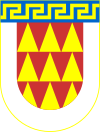Bitolj
|
Bitola Битола |
|||
|---|---|---|---|

Širok Sokak street
|
|||
|
|||
| Nickname(s): Градот на конзулите "The City of Consuls" | |||
| Motto: Bitola, babam Bitola | |||
| Coordinates: 41°01′55″N 21°20′05″E / 41.03194°N 21.33472°ECoordinates: 41°01′55″N 21°20′05″E / 41.03194°N 21.33472°E | |||
| Country |
|
||
| Region |
|
||
| Municipality |
|
||
| Government | |||
| • Mayor | Vladimir Taleski (VMRO-DPMNE) | ||
| Area | |||
| • City | 422.39 km2 (163.09 sq mi) | ||
| Elevation | +576 m (1,890 ft) | ||
| Population (2002) | |||
| • City | 74,550 | ||
| • Density | 180/km2 (460/sq mi) | ||
| • Metro |
|
||
| Time zone | CET (UTC+1) | ||
| • Summer (DST) | CEST (UTC+2) | ||
| Postal codes | 7000 | ||
| Area code(s) | +389 (0)47 | ||
| Car plates | BT | ||
| Climate | Cfb | ||
| Website | www |
||
Bitola (Macedonian: Битола [ˈbitɔɫa] known also by several alternative names) is a city in the southwestern part of the Republic of Macedonia. It is located in the southern part of the Pelagonia valley, surrounded by the Baba, Nidže and Kajmakčalan mountain ranges, 14 kilometres (9 miles) north of the Medžitlija-Níki border crossing with Greece. The city stands at an important junction connecting the south of the Adriatic Sea region with the Aegean Sea and Central Europe, and is an administrative, cultural, industrial, commercial, and educational centre. It has been known since the Ottoman period as "The City of The Consuls", since many European countries had consulates in Bitola.
Bitola is one of the oldest cities on the territory of The Republic of Macedonia, having been founded as Heraclea Lyncestis in the middle of the 4th century BC by Philip II of Macedon. The city was the last capital of Ottoman Rumelia, from 1836–1867. According to the 2002 census, Bitola is the second-largest city in the country. Bitola is also the seat of the Bitola Municipality.
The name Bitola is derived from the Old Church Slavonic word ѡ҆би́тѣл҄ь (obitěĺь, meaning "monastery, cloister") as the city was formerly noted for its monastery. When the meaning of the name was no longer understood, it lost its prefix "o-". The name Bitola is mentioned in the Bitola inscription, related to the old city fortress built in 1015. Modern Slavic variants include the Macedonian Bitola (Битола), the Serbian Bitolj (Битољ) and Bulgarian Bitolya (Битоля). In Byzantine times, the name was Hellenized to Voutélion (Βουτέλιον) or Vitólia (Βιτώλια), hence the names Butella used by William of Tyre and Butili by the Arab geographer al-Idrisi. During the ruling of Radomir Gavril(1014–1015) Bitola is mentioned under the name of Buteliu. The Aromanian name is Bituli.
...
Wikipedia



